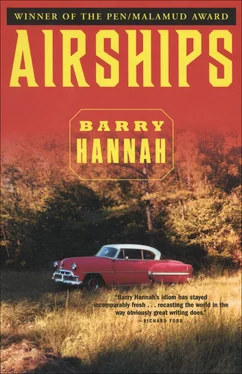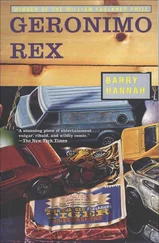This book is for Patricia B.,
Blue-eyed Nebraska lady
This book honors the memory of Arnold Gingrich.
Its publication was in part provided for by the
men and women who were his colleagues at Esquire,
the magazine he founded and edited with distinction.
All of us who are writers take heart from the confident expectation that truly wonderful, provocative, pleasure-giving writing will eventually get its due. In thirty-three years of writing stories and novels, Barry Hannah has made a signal and inimitable contribution to the life of the short story and to the vivacity of American imaginative writing. I’m positive that nobody writing stories in America today doesn’t know Barry Hannah’s work, and that everybody writing has been affected by it in one way or another.
This does not mean that Hannah’s due is to be that most unloveable of things, a writer’s writer — which means that you’re always broke and that only other writers read you, when they get your books for free. Barry Hannah’s work has stayed in print and widely read since the celebrated publication of his first, unforgettable book — a novel— Geronimo Rex , in 1972, a critical affirmation corroborated by readers and permanently forged by his first collection of short stories, this very book, in 1978, the likes of which the American reading and reviewing public had simply never seen before.
Richard Blackmur wrote once — about poetry — that real poetry is distinguishable from mere verse by the animating presence of a “fresh idiom: language so twisted and posed in a form that it not only expresses the matter at hand but adds to the stock of available reality.”
Poetry, of course, has it a little easier than prose would have it in satisfying Blackmur’s stipulation, since modern poetry, anyway, is less likely to be as strenuously asked to “express the matter at hand.” Whereas prose is the dray horse of ordinary, at hand communication, and as such is somewhat resistant to truly “fresh idiom.” Generations of American prose writers — Gertrude Stein, Kenneth Patchen, Anaïs Nin, Donald Barthelme — have banged themselves and their sentences against conventional and intransigent American prose syntax, grammar, and diction, with often unsustained results — failing most often to express the matter at hand, while doing much better at the “twisted and posed” parts.
Maybe you just can’t try to do both at once. Either you naturally do them, like Faulkner, like Alice Munro, like Ray Carver, or you don’t. After which realization you can choose to step back into the “realistic tradition.”
In the course of four collections of short stories, Barry Hannah’s idiom has stayed incomparably fresh, if occasionally a little twisted. And his sense of what’s-real-at-ground-level — what is the matter at hand — bedazzles our own sense of what’s actual like a glittering reproof. Places, characters’ names, emotions, impulses, consequences that seem utterly familiar to us taunt, provoke, and shock us in Hannah’s stories. His view of humanity is skeptical, not always favorable, frequently hilarious. His work is a lifelong revel in our own blunt human fecklessness and unpredictability. Barry most often approaches the very serious by way of the blatantly unserious, and challenges us to determine what seriousness — ours, the world’s — actually comes to.
You can’t quite imagine what it was like to be a young writer from the South, as I was thirty years ago, steeped in the preoccupations and the sounds of Faulkner and his imitators, and also steeped in Eudora Welty and Walker Percy and Richard Wright — these Mississippians — and then to find Barry Hannah recasting the world in the way obviously great writing does. And my own age, too. And from Clinton, Mississippi, no less — right across town from me. It was both daunting and thrilling. His very conception of what a story could be was one I’d never thought of. His sentences had, among their teeming effects and emotions, a perilous feel; words running almost sedately at precipice-edge between sense and hysteria; verbal connectives that didn’t respect regular bounds and might in fact say anything . If voice is the music of a writer’s intelligence, Barry’s voice was the one many of us hear when we speak candidly to ourselves — subversive, inventive, unpredictable, funnier than we can be in public and certainly on the page. This was and is a true voice, though also truly literary — which is to say, heightened, felicitous, privileged speech you converse with intimately in your mind. And because it was clearly so good, and because I knew no one else could do it the way he did, it was best for me, his reader, those years ago, not to think it was daunting and thrilling, but that it was thrilling. Which is what I think to this minute.
For better or for worse, in his writing life, Barry has spent time as a teacher of young writers. I’ve always thought it was cruel that impressionable young novice writers, having gotten their first sniff of Barry’s work, should come — as they do — to sit at his feet and try to learn to do even some little bit of what he does. You can’t do what he does. It’s hopeless for them. It’s a law-of-the-jungle measure of excellence, I suppose, that this kind of rare talent isn’t impartable.
I have no wish to heap on more cloying praise or painful, hyperbolic exegesis, though Barry would perhaps like me to. But when I was called on to award Barry Hannah the PEN-Malamud Award for Excellence in the Short Story, it was simply to give him his due , as it has been his due since the publication of the volume you hold in your hands. This is a rare writer and a rare and wonderful book — still thrilling after all these years.
— Richard Ford
When I am run down and flocked around by the world, I go down to Farte Cove off the Yazoo River and take my beer to the end of the pier where the old liars are still snapping and wheezing at one another. The line-up is always different, because they’re always dying out or succumbing to constipation, etc., whereupon they go back to the cabins and wait for a good day when they can come out and lie again, leaning on the rail with coats full of bran cookies. The son of the man the cove was named for is often out there. He pronounces his name Far tay , with a great French stress on the last syllable. Otherwise you might laugh at his history or ignore it in favor of the name as it’s spelled on the sign.
I’m glad it’s not my name.
This poor dignified man has had to explain his nobility to the semiliterate of half of America before he could even begin a decent conversation with them. On the other hand, Farte, Jr., is a great liar himself. He tells about seeing ghost people around the lake and tells big loose ones about the size of the fish those ghosts took out of Farte Cove in years past.
Last year I turned thirty-three years old and, raised a Baptist, I had a sense of being Jesus and coming to something decided in my life — because we all know Jesus was crucified at thirty-three. It had all seemed especially important, what you do in this year, and holy with meaning.
On the morning after my birthday party, during which I and my wife almost drowned in vodka cocktails, we both woke up to the making of a truth session about the lovers we’d had before we met each other. I had a mildly exciting and usual history, and she had about the same, which surprised me. For ten years she’d sworn I was the first. I could not believe her history was exactly equal with mine. It hurt me to think that in the era when there were supposed to be virgins she had allowed anyone but me , and so on.
Читать дальше












